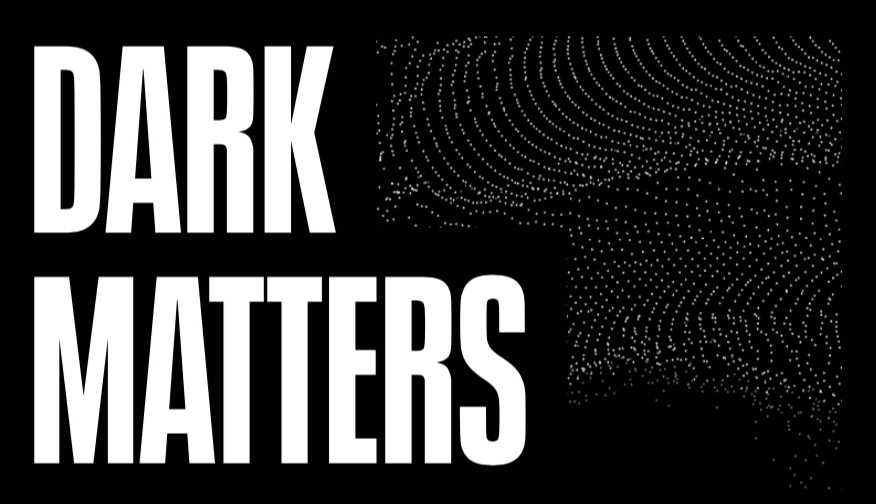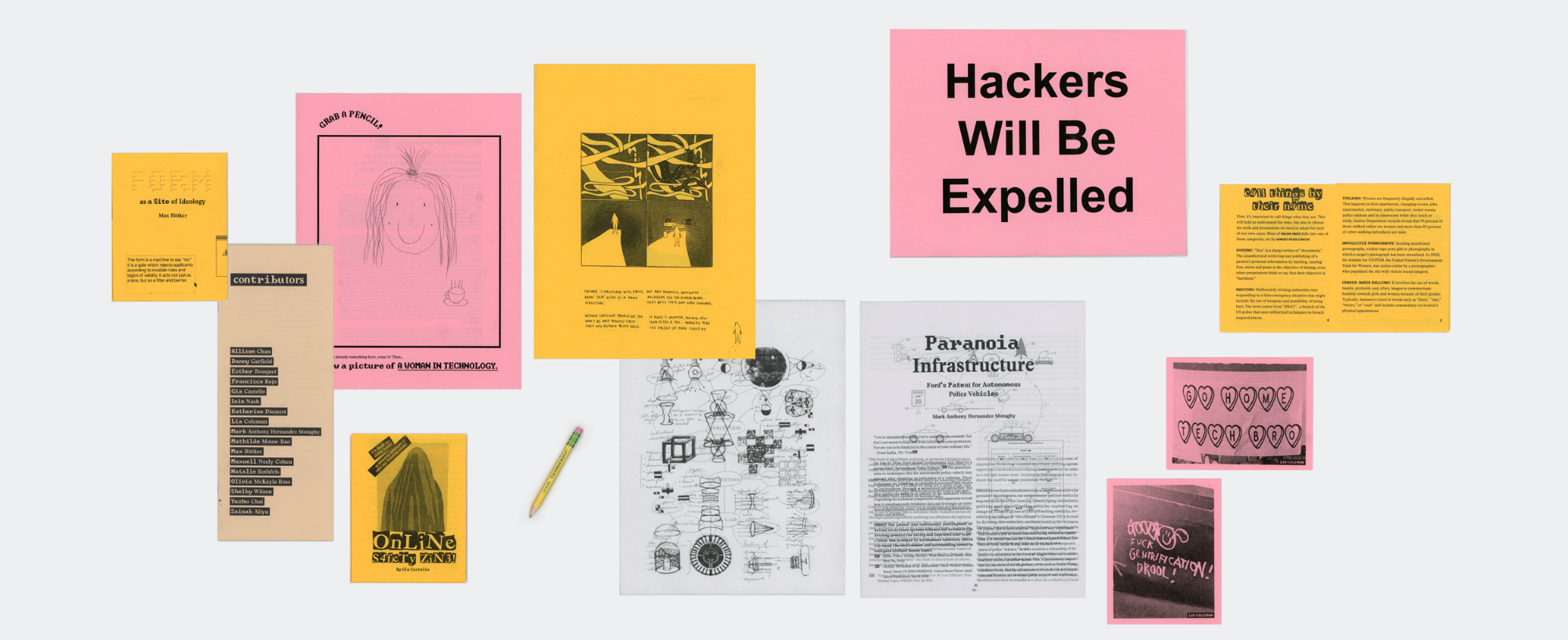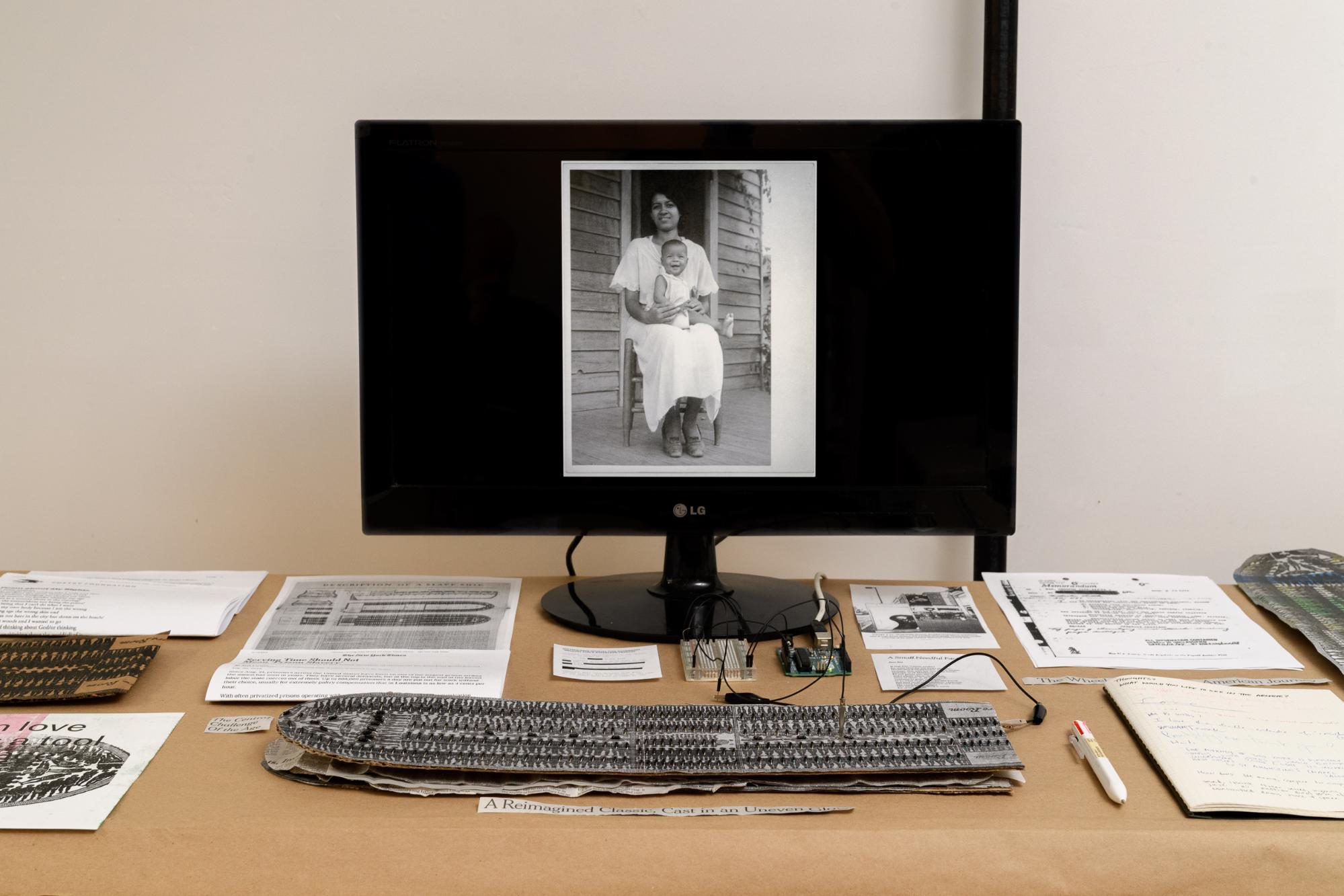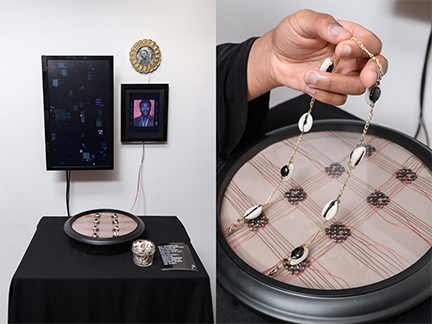
Dark Matters Expanded
- May 20th ~ July 22nd, total of 10 classes plus additional times for one-on-ones and class discussions (Details in schedule below)
- Classes will be held Wednesdays, from 1pm - 3pm EST.
- Applications to Dark Matters are now closed. Sign up here to receive an email when we announce an upcoming session.
- We will be accepting up to 18 students to the cohort/cohort plus and up to 50 students to audit the class.
- Enrollment ends on Sunday, May 10th and we will be reaching out to all applicants on Tuesday, May 12th.
- Feel free to contact us with any questions, darkmatters@sfpc.io
In this critical theory of technology course, together we will consider the racialized history of surveillance and the positioning of white as neutral within interfaces as forms of violence enacted through high technology. We will discuss in small groups, large discussions, and one-on-one how we all can use computational systems to create change while holding them accountable for their origins and biases. By reading critical texts, streaming artworks and interacting with professional guests we will learn how these structures are compromised so that we can begin to imagine what an outside to them might look like.
This class relies on an expanded notion of study, where we will challenge one another to think outside the box about what learning is and ultimately can be. We will also look at the practices of contemporary artists critiquing (and expanding the imaginary within) technology as examples of how radical imagination can be evoked through artistic practice. By the end of the class we will publish a digital publication containing original contributions from every member of the class.
What will students be learning?
- The ability to communicate complex ideas through writing and discussion with peers.
- A more conscientious approach to developing new tech and design solutions that reflect our current moment which prioritizes equity.
- A nuanced critical perspective towards technological objects and their generation of power and control in society.
- A thorough knowledge of the history of surveillance practices in the United States.
- An understanding of the economy which assumes the possibility of humans being valued as commodities.
- An interdisciplinary understanding of the relationship between art, design, technology, and economics.
Who are the teachers?
American Artist, Teacher - is an artist whose work considers black labor and visibility within networked life. Their practice makes use of video, installation, new media, and writing. Artist is a 2018-2019 recipient of the Queens Museum Jerome Foundation Fellowship. They are a former resident of Pioneer Works Tech Residency, EYEBEAM, Abrons Art Center, and completed the Whitney Independent Study program as an artist in 2017. They have exhibited at the Museum of African Diaspora, San Francisco; the Studio Museum in Harlem; Museum of Contemporary Art Chicago, and Koenig & Clinton, New York. Their work has been featured in the New York Times, Artforum, ARTnews, and Huffington Post. They have published writing in The New Inquiry and Art21 and have been featured in The New York Times, Artforum, ARTnews, and Huffington Post. Artist is a part-time faculty at The New School and teaches Critical Theory at SFPC.
Zainab Aliyu (Zai), Teaching Assistant - is a cultural worker, designer and artist based in New York. Her practice, which spans installations, virtual environments, archives, writings, printed matter and community-participatory (de)programming, interrogates the cybernetic and temporal entanglement embedded within societal dynamics. Zai is an alum of the Fall 2019 cohort at SFPC.
This class is organized by Lauren Gardner of the School for Poetic Computation.
How will the class be conducted?
We will conduct the class online via Zoom between 1 to 3 pm EST on Wednesdays. Teacher and TA will be available at dedicated hours through the week for individual questions and discussion. In addition to online classes and one-on-ones, we will be using Slack for communication, Google calendar to stay organized, Calend.ly to schedule one-on-ones, and Zoom for class meetings and office hours. You do not need to create accounts on these services yet, we will send you information once you are accepted.
Final project: Over the course of the 10 weeks, we will be working on a collaborative publication relating to themes discussed in class, and by the end of the class we will publish this as a digital publication containing original contributions from every member of the class. See past years’ publications (Spring 2019), (Fall 2018) and (Fall 2019).
Culture: SFPC fosters a collaborative and relaxed learning environment. We value your questions and want to make sure all students feel comfortable engaging with the teachers and material fully. Although we will not be sitting around the same table, we are committed to offer the same level of support and dedication to this cohort of students.
What is expected of me?
- Students should come with an open mind and an interest in helping one another to learn by providing a welcome learning environment.
- Be open to questioning things we take for granted as normal. How can we destabilize and decenter power structures considered normal to everyday life?
- Please be prepared to dedicate up to 5 hours of additional study (readings and assignments) and work time to the class outside of the 3 hours of class time each week.
- It is suggested that students purchase the books that we will read, but it is not required as all texts will be provided digitally.
 |
|---|
| Dark Matters zine from previous cohort |
Is this the right class for me?
If this sounds like you, then YES!
- If you are a coder or tech worker and you want to think more critically about the social and economic impact of computers.
- If you are NOT a coder or tech worker but you want a deeper understanding of how code affects everything around us.
- If you are a fan of The Matrix (1999).
If this sounds like you, then this class may not be for you:
- If you want to learn to code or hone your computer skills.
- If you think Adam Smith was onto something.
- If you think the cloud is in the sky.
 |
|---|
| Final project from Neta Bomani displayed at student showcase |
What do previous students have to say?
“As someone coming from an engineering educational background, the course was one of my first experiences having critical discussions about technology, race, theory, and more in a group setting. Dark Matters was rigorous in all of the right ways and it has left a lasting impact on the way I think, research, and write” — Bomani Oseni McClendon, Spring ‘19
“Taking this class gave me such a vital vocabulary and lens for looking at computing and power. American’s carefully chosen readings and the discussions we had were my introduction to talking to others about technology critically. I can’t imagine how anyone can consider a computer science education complete without understanding the topics covered in this course. A total once-in-a-lifetime experience!” — Olivia Ross, Fall ‘19
“Coming into SFPC as a programmer, I was surprised to find American Artist’s critical theory class the most intellectually challenging and rewarding of my SFPC experience. The readings and discussions helped me reexamine my long-held assumptions about technology and inspired my artistic practice. Anyone who works in technology should take this class.” — Alex Miller, Spring ‘19
“It’s easy to forget that the computers, interfaces, algorithms, and hardware that are so integrated in our personal and professional lives were made by people with inherent biases. I found Dark Matters to be invaluable in encouraging a critical mindset and discussion, and peeling back the complicated histories of some of the ubiquitous technologies that we take for granted.” — Shelby Wilson, Fall ‘19
“Critical Theory was eye-opening to me after having majored in computer engineering and worked in tech for a couple years. It made me rethink my relationship with technology and should be a required curriculum for anybody working with computers.” — Francisco Rojo, Fall ‘19
Schedule
There will be one 45-minute lecture video each week that you must watch before meeting together as a class.
Online class meetings will take place Wednesdays, 1pm to 3pm EST (Mandatory) Approximately 2 hours of Teacher & 5 hours of TA support during the week based on student availability. Use this time to schedule one-on-ones to review any questions you might have about readings and assignments.
- Week 1 Orientation History of SFPC, code of conduct, learning objectives, about the zine publication, meet the students
- Week 2: Software as Ideology We will be looking at the origin of computer interfaces and how they obscure reality, compared to a traditional model of ideology.
- Week 3: The Land Before Silicon Valley This discussion will focus on the origins of settler colonialism in the Western United States and the preface to modern-day Silicon Valley.
- Week 4: Towards an Unsovereign Technology This week begins with American Artist’s theory of the Black Gooey, and what an unsovereign technology might look like. + Guest Meal
- Week 5: Surveillance Studies We will begin considering the origins of surveillance technology in the United States, and it’s roots in racial capital.
- Week 6:The Birth of Biometrics Building on the previous week, we will unpack how the body as data is related to the legacy of racial slavery.+ Guest Meal
- Week 7: America’s Debt Economy This week’s discussion is an overview of neoliberal economic practices in America, their effect on social life, and the growth of policing and incarceration.
- Week 8: A Recent History of Algorithmic Policing Building on the previous discussion we will look at how the Military, University, High Tech, and Police came together to create a perfect data storm.
- Week 9: Reimagining Justice We will consider the history of light as a tool of oppression and illumination as well as how to proceed in creating an equitable future within technology.
- Week 10: Graduation/Salon We will share our collaborative publication with the community via Zoom event.
 |
|---|
| Final project from Zainab Aliyu displayed at student showcase |
How much is tuition?
We are offering different options for student engagement in the hopes of making this class more accessable and for it to reach a larger audience.
When enrollment opens, we will prioritize applicants for the cohort. If we fill the cohort, we will open an additional auditing / independent study option. If you are intersted in auditing the class, please let us know in the application and we will contact you once the cohort is full.
$975 (Cohort)
- First week orientation
- Up to 1 hour office hours across the 10 weeks
- Contribute to zine
- 8 weeks x 2 hour discussion with American and Zai ** Afternoon session (18 students) ** 30 min breakouts during 2 hr session
- Last week culmination
$1200 Cohort Add-on ($975 + $225) - everything mentioned above, plus:
- 2+ Dinners with special guests/Q&A hangout (10 students max) ** Send lecture and/or reading related to guest beforehand
- Unlimited sign up for available office hours
- Group studio visit with American Artist
We will cap the enrollment for the cohort + cohort add on at 18 students max with a limit of 10 students max for the add on portion.
$125 (Auditing / Independent Study) - capped at 50 people
- 8 weeks of 45 min weekly lecture videos
- Access to readings and guides
Notes about costs
- Price of classes does not include Eventbrite Processing Fees
We are completely self-funded, which dramatically limits our ability to offer scholarships. While we price our classes reasonably to offer quality learning experiences, we understand the tuition is beyond the reach of many people. We are sensitive to the rapidly changing economy due to the COVID-19. While we can’t offer scholarships like the past, we hope to support students in need. Our previous students have received support from cultural foundations, schools, current employers, or crowdfunding. We are happy to provide supporting materials as proof of acceptance. Please check out these resources for financial support in response to the COVID19 pandemic.
We are committed to being fully transparent about how we make and spend money. In the spirit of radical openness and generosity, on which the school was founded, we open-source our finances on Github. There, you can read financial reports and download raw statements.
What if I can’t go, can I get a refund?
- Yes, we can give you 100% refund up to 2 days before class starts
- 50% refund after 2 days, until the first day of class
- No refunds can be given after the first day of class
How do I apply?
We will be accepting up to 18 students to the cohort/cohort plus and up to 50 students to audit the class. Enrollment ends on Sunday, May 10th and we will be reaching out to all applicants on Tuesday, May 12th.
We will first select students for the cohort/cohort plus option. Once full, an email will be sent to make tickets available for everyone interested in auditing the class. Please apply using the link below if you are interested in auditing the class only.